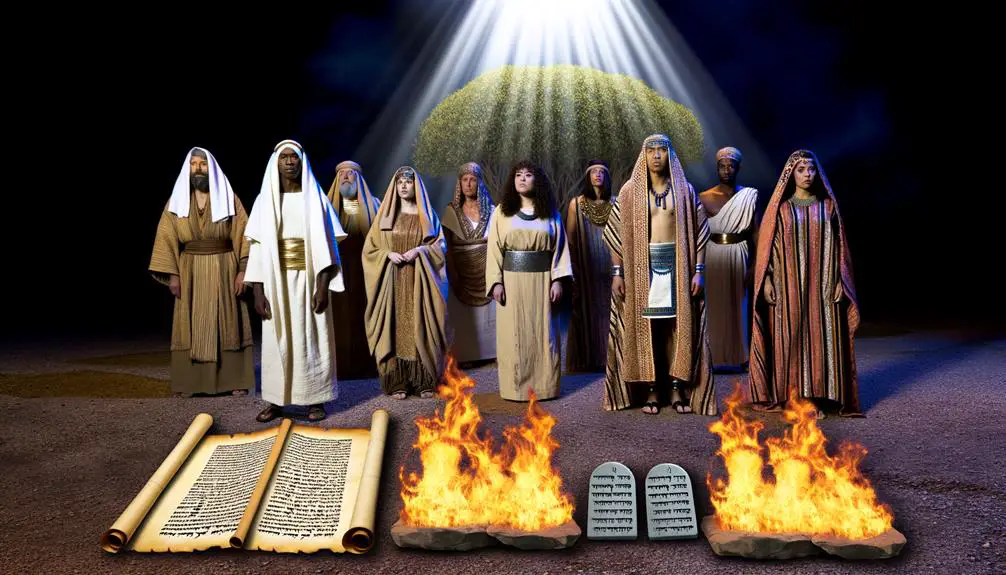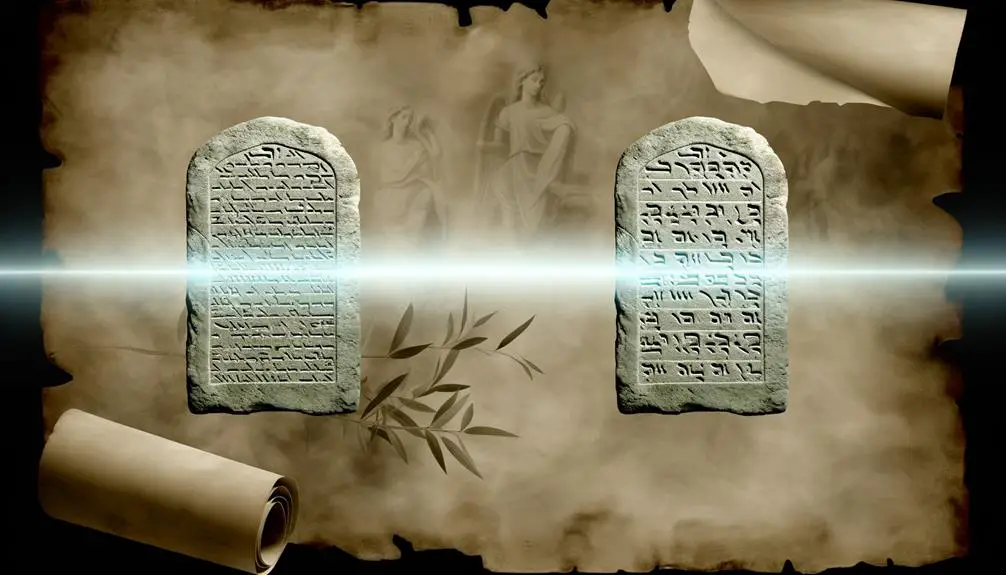Navigate the depths of biblical statutes to uncover their timeless impact on spirituality and law, revealing layers of meaning in ancient texts.

What Does Statutes Mean in the Bible
As the old saying goes, 'The devil is in the details,' and when you're navigating the intricate landscape of the Bible, understanding the nuance of terms like 'statutes' is crucial. These aren't just ancient laws lost in time; they're a key to unlocking the societal and spiritual fabric of early Israel.
But how do these statutes differ from commandments, and why should you care about their distinction today? Peeling back these layers not only offers a deeper appreciation of biblical texts but also sheds light on their relevance in modern spiritual discourse.
Let's explore this further, and you might find that these ancient texts hold more significance than you initially thought.
Key Takeaways
- Statutes in the Bible refer to specific laws given by God to guide moral and spiritual conduct.
- These statutes cover ceremonial, moral, and legal aspects of life, ensuring social order and religious purity.
- Biblical statutes embody timeless values like justice, mercy, and compassion, influencing ethical decision-making.
- They adapt to changing circumstances, maintaining relevance through their applications in modern ethical and social issues.
Defining 'Statutes' in Scripture

In exploring the Scriptures, one finds that the term 'statutes' refers to divinely mandated laws or decrees intended to guide the moral and spiritual conduct of the faithful. These statutes aren't merely historical artifacts; they embody timeless principles meant to shape the lives of believers. The translation of these statutes into modern languages has been a meticulous process, aiming to preserve their original meaning while making them accessible to contemporary readers.
Statute translations are crucial for understanding the Bible's message in today's context. Translators face the challenge of conveying ancient legal and moral concepts in a way that resonates with modern sensibilities without compromising the text's integrity. This task requires not only linguistic skills but also a deep understanding of the cultural and historical backgrounds from which these statutes emerged.
The modern relevance of biblical statutes lies in their capacity to inform ethical decision-making and spiritual reflection. While the societal context has changed dramatically since these laws were first written, the underlying moral principles often remain pertinent. For instance, statutes that emphasize justice, compassion, and integrity can guide current discussions on social and personal ethics.
However, interpreting these statutes for contemporary application demands discernment. Believers must navigate the delicate balance between adhering to the letter of the law and embracing its spirit. This process involves engaging with the text critically and reflectively, considering both the specific circumstances of its origin and its potential implications for today's world.
Historical Context of Biblical Statutes

You must consider the origins of biblical laws to grasp their full significance within their ancient contexts.
The influence of surrounding societies on these statutes reveals a complex interplay of cultural and religious factors.
Understanding how interpretations have evolved over time sheds light on their contemporary relevance and application.
Origins of Biblical Laws
Understanding the origins of biblical laws requires delving into their historical context, which reveals how ancient societies' norms and divine directives intertwined to shape these statutes. The codification process of these laws wasn't merely a transcription of divine will but also a reflection of legal adaptations necessary for the societies at that time.
Scholars argue that this codification process involved a dynamic interplay between existing societal norms and perceived divine mandates, leading to a body of laws that were both spiritually motivated and practically applicable. This intricate process underscores the complexity of biblical laws, highlighting their role not just in religious observance but in the governance and social regulation of ancient communities.
Ancient Societal Influence
Building on the origins of biblical laws, it's crucial to examine the profound impact ancient societies had on the formation of these statutes, highlighting the historical context that shaped their development.
Aspect |
Influence on Biblical Statutes |
Example |
|---|---|---|
Cultural Adaptations |
Integrated customs |
Dietary laws |
Social Hierarchies |
Codified social roles |
Rules governing priesthood |
Legal Systems |
Framework for justice |
Guidelines for fair trials |
These elements showcase how ancient societal structures and norms deeply influenced the crafting of biblical laws. Cultural adaptations were crucial, allowing the integration of surrounding customs into the biblical narrative. Social hierarchies were distinctly codified, reflecting and reinforcing the roles within these ancient communities. Moreover, the adoption of legal systems from neighboring civilizations provided a comprehensive framework for justice, which was essential for maintaining order and fairness.
Interpretation Over Time
Over time, interpretations of biblical statutes have evolved, reflecting shifts in societal values, advancements in scholarship, and changing cultural contexts.
Modern reinterpretations often emphasize the underlying principles of love, justice, and mercy, rather than literal adherence to rules that may not directly apply to contemporary life. Scholars argue that cultural adaptations are necessary to maintain the relevance of these ancient texts.
Types of Statutes in the Bible

You'll find that the Bible encompasses a variety of statutes, each serving distinct roles within the scriptural narrative.
The ceremonial statutes, for instance, articulate the rituals and practices pivotal to religious observance, while moral laws lay down the ethical and moral foundations expected of believers.
Understanding these categories enriches comprehension of the biblical text's multifaceted legal and spiritual landscape.
Ceremonial Statutes Overview
In exploring the types of statutes in the Bible, ceremonial statutes play a pivotal role in illustrating the religious practices and rituals ordained for the Israelites. These statutes encompass a wide array of directives aimed at ensuring ritual purity and guiding festival observances among God's chosen people.
They're not merely ancient rituals; they symbolize deeper spiritual truths and foreshadow greater realities within the faith. By adhering to these ceremonial laws, the Israelites distinguished themselves from neighboring nations, cultivating a unique identity centered around their relationship with Yahweh.
These practices, including specific sacrifices and purity laws, were integral in maintaining the holiness required by God, emphasizing the importance of obedience and reverence in their communal and spiritual lives.
Moral Laws Explained
Shifting focus to moral laws, it's essential to recognize them as the backbone of ethical conduct prescribed within the Bible. These statutes not only guided ancient societies but also offer insights into resolving contemporary ethical dilemmas. Their relevance persists as they address core human values and behaviors.
- Respect for Life: Upholding the sanctity of life, these laws instruct against murder, emphasizing the value of each individual.
- Honesty: Encouraging truthfulness in dealings, they warn against deceit and theft.
- Purity: Advocating for moral integrity, especially in relationships.
- Justice: Stressing fair treatment for all, they command care for the marginalized.
These principles, deeply rooted in biblical teachings, continue to influence moral reasoning and ethical decision-making, highlighting their enduring contemporary relevance.
Significance of Statutes for Israel

Understanding the significance of statutes for Israel necessitates an appreciation of their role in shaping the nation's identity and guiding its moral and legal framework. These statutes weren't merely ancient laws; they represented a direct communication from God, intended to set Israel apart from other nations by defining a unique way of life centered around holiness, justice, and communal welfare. This divine legal system encompassed various aspects of daily life, from dietary restrictions to social justice principles, aiming to create a society that reflected God's character and intentions for humanity.
The statutes provided Israel with a tangible connection to their heritage and a constant reminder of their covenant with God. They weren't static; as Israel evolved, so did the interpretation and application of these statutes, allowing for cultural adaptation while maintaining their core spiritual and moral values. This ability to adapt highlights their modern relevance, as it offers a framework for navigating contemporary ethical dilemmas through a lens that balances tradition with cultural sensitivity.
As you delve deeper into the statutes' role in Israel's history, it's clear they were foundational in molding a collective identity that transcended individual tribes and families, uniting them under a shared set of values and beliefs. This unity was crucial for their survival and prosperity, especially as they faced external threats and internal challenges. The statutes served as a guide, teaching Israel how to live in a way that honored God and fostered a just, compassionate society. Their significance, therefore, lies not only in their historical context but in their enduring influence on the moral and legal principles that continue to shape communities today.
Statutes Vs. Commandments: a Comparison

While examining the role of statutes in Israel's identity and moral framework, it's also crucial to compare these statutes with commandments to fully grasp their distinct functions within biblical texts. Understanding the differences between statutes and commandments isn't just about splitting hairs over terminology; it's about appreciating the legal nuances and the cultural adaptation these distinctions reveal.
- Origin and Authority: Commandments are direct instructions from God, often associated with the Ten Commandments given to Moses on Mount Sinai. They're universal, moral imperatives. In contrast, statutes are more specific laws, given to guide the Israelites in their daily lives and religious practices. They include rituals, ceremonies, and civil laws, reflecting a direct application of commandment principles in specific contexts.
- Function and Purpose: Commandments serve as the foundation of ethical and moral conduct, emphasizing the relationship between God and humanity. Statutes, however, detail the practical application of these commandments within the community, ensuring social order and religious purity.
- Flexibility and Adaptation: Statutes exhibit a degree of cultural adaptation, changing with circumstances and needs of the people. This flexibility allows them to address contemporary issues within the framework of unchanging commandments.
- Legal Nuances: The legal nuances in statutes demonstrate an intricate system of governance and worship, distinguishing them from the broad, overarching nature of commandments. This distinction underscores the dynamic nature of biblical law, accommodating both divine command and human condition.
Understanding the balance and interplay between statutes and commandments sheds light on the sophisticated legal and moral system presented in the Bible, revealing its relevance across generations and cultures.
The Role of Statutes in Prophecy

In biblical literature, statutes play a crucial role in prophecy, serving as both indicators and instruments of divine will within historical and eschatological contexts. These statutes, often seen as divine mandates, are intricately linked with the concept of prophetic fulfillment. As you delve deeper into the scriptures, you'll notice that the prophets frequently reference the adherence or violation of statutes as a pivotal factor in the unfolding of God's plans for His people.
The statutes, therefore, aren't merely ancient laws but are imbued with predictive power. They set a framework within which the divine narrative unfolds, offering a lens through which one can understand the movement from prophecy to fulfillment. This dynamic is particularly evident in the way that certain prophecies hinge on the observance or neglect of these divine statutes. Through this lens, one perceives how adherence to God's statutes can lead to blessings, while their violation often precipitates divine judgment or calls for repentance.
Drawing modern parallels, the role of statutes in biblical prophecy encourages contemporary readers to reflect on the continuity of divine principles across ages. It suggests that the divine expectations articulated through ancient statutes continue to hold relevance, offering insights into how current events might similarly be seen as part of a broader, divinely orchestrated narrative.
This analytical perspective underscores the enduring significance of biblical statutes, not just as historical artifacts but as active components in the unfolding of divine will. Through this understanding, one gains a deeper appreciation for the intricate relationship between divine statutes and prophetic fulfillment, bridging the ancient texts with contemporary spiritual reflection.
Statutes in New Testament Perspectives

Shifting our focus to the New Testament, it's crucial to consider how statutes are reinterpreted and applied within the context of Jesus' teachings and the early Christian community. The New Testament, while not as vocal on statutes as the Old Testament, provides a nuanced understanding that reflects the shift from law to grace. Here, the silence on specific statutes isn't an oversight but a deliberate move towards a grace emphasis, highlighting a transformative approach to understanding God's will.
- New Testament Silence: The relative lack of detailed statutes in the New Testament doesn't indicate irrelevance but underscores a transition from a legalistic framework to one centered on faith and grace. This silence is strategic, directing focus towards internal transformation over external adherence.
- Grace Emphasis: Jesus' teachings pivot from strict legal adherence to principles of love, mercy, and grace. This grace emphasis signifies a profound reinterpretation of statutes, suggesting that the spirit of the law transcends its letter.
- Internal Transformation: The New Testament urges believers to internalize God's commands, emphasizing a heart-oriented approach to God's will. This shift from external compliance to internal transformation reflects a deeper engagement with the divine.
- Community Ethos: The early Christian community's approach to statutes is characterized by a communal discernment process, prioritizing collective well-being and mutual love over individualistic legal observance.
In the New Testament perspective, statutes are re-envisioned within a broader narrative of grace and redemption, calling for an inward transformation that aligns with God's ultimate purposes for humanity.
Applying Biblical Statutes Today

Considering the evolving landscape of modern spirituality, it's essential to explore how biblical statutes can be applied in today's context. As society advances, the interpretative frameworks we use to understand ancient texts must also evolve. This doesn't mean altering the core messages but rather finding their societal relevance and modern applications.
Biblical statutes, when viewed through a contemporary lens, can offer profound insights into ethics, morality, and community building. It's important to discern their foundational principles and translate these into actions that resonate with today's challenges and values. Here's a table that illustrates how some of these statutes can be applied:
Biblical Statute |
Modern Application |
Societal Relevance |
|---|---|---|
Love thy neighbor |
Community Service |
Promotes social cohesion |
Sabbath rest |
Work-life balance |
Addresses burnout culture |
Forgiving debts |
Financial mercy programs |
Mitigates economic inequality |
Justice for the poor |
Social justice initiatives |
Ensures equitable treatment |
Stewardship of Earth |
Environmental conservation |
Combats climate change |
These applications represent a bridge between ancient wisdom and contemporary societal needs. They remind us that the essence of biblical statutes—justice, mercy, and compassion—remains deeply relevant. By integrating these principles into personal and communal practices, you contribute to a society that reflects these timeless values.
Frequently Asked Questions
How Have Various Christian Denominations Interpreted the Relevance of Old Testament Statutes in Contemporary Worship and Practice?
You'll find that various Christian denominations have unique takes on integrating Old Testament statutes into modern worship and practice. This diversity stems from differing views on church traditions and scriptural authority.
While some emphasize a direct adherence, considering these statutes as timeless, others view them through a historical-cultural lens, opting for principles rather than literal application. This analytical approach reveals a broad spectrum of interpretations within the Christian faith.
Are There Any Records of Changes or Evolutions in the Understanding or Application of Specific Biblical Statutes Over the Centuries Within the Jewish Faith?
Yes, there've been significant shifts in the understanding and application of biblical statutes within the Jewish faith, much like a tree's roots grow deep and spread over time.
Through textual analysis and exploring historical context, scholars have traced how interpretations have evolved, reflecting changing societal norms and philosophical insights.
These adaptations demonstrate a dynamic relationship between sacred texts and the lived experiences of Jewish communities, offering a nuanced view of religious observance and law.
How Do Non-Abrahamic Religions View the Concept of Statutes as Presented in the Bible, if They Consider Them at All?
You might find it intriguing that non-Abrahamic religions like Hinduism and Buddhism don't directly engage with Biblical statutes. Instead, they've their own frameworks, such as Hindu Dharma and Buddhist ethical parallels, which serve similar functions.
When comparing these, you'll notice that while the specifics differ, the underlying principles often echo themes of morality, duty, and the right way of living, suggesting a universal quest for guiding societal and personal conduct.
What Role Do Biblical Statutes Play in the Theological Debates About Morality and Ethics in the Modern World?
In modern theological debates about morality and ethics, you'll find that biblical statutes often serve as a cornerstone. They're not just historical artifacts but are critically examined within various cultural contexts to address ethical dilemmas today.
Scholars and moral thinkers analyze these ancient laws to understand their relevance and application in contemporary society, navigating the complex interplay between timeless principles and evolving societal norms. This exploration is crucial for informed, ethical decision-making.
Can Biblical Statutes Be Linked to Any Secular Laws or Statutes in Different Countries Today, and How Is This Influence Justified or Contested by Scholars?
You're exploring how biblical statutes have influenced secular laws in various countries, focusing on their legal origins and cultural adaptation.
This connection is meticulously analyzed by scholars, who often debate the extent of this influence and whether it's directly traceable or more nuanced.
They delve into the justification or contestation of these links, examining how ancient religious laws have been adapted or rejected in light of modern legal and ethical frameworks.
Conclusion
In sum, statutes stand as symbolic, significant, and steadfast structures within Scripture, shaping the spiritual and societal standards of ancient Israel. These divine directives distinguish themselves from commandments through nuanced natures, nurturing a narrative of obedience and orthodoxy.
Analyzing these ancient articulations allows for a richer understanding of biblical beliefs and behaviors. However, their application today treads a tightrope between historical homage and contemporary contemplation, challenging Christians to consider their relevance and resonance in real-world reflection.



Sign up